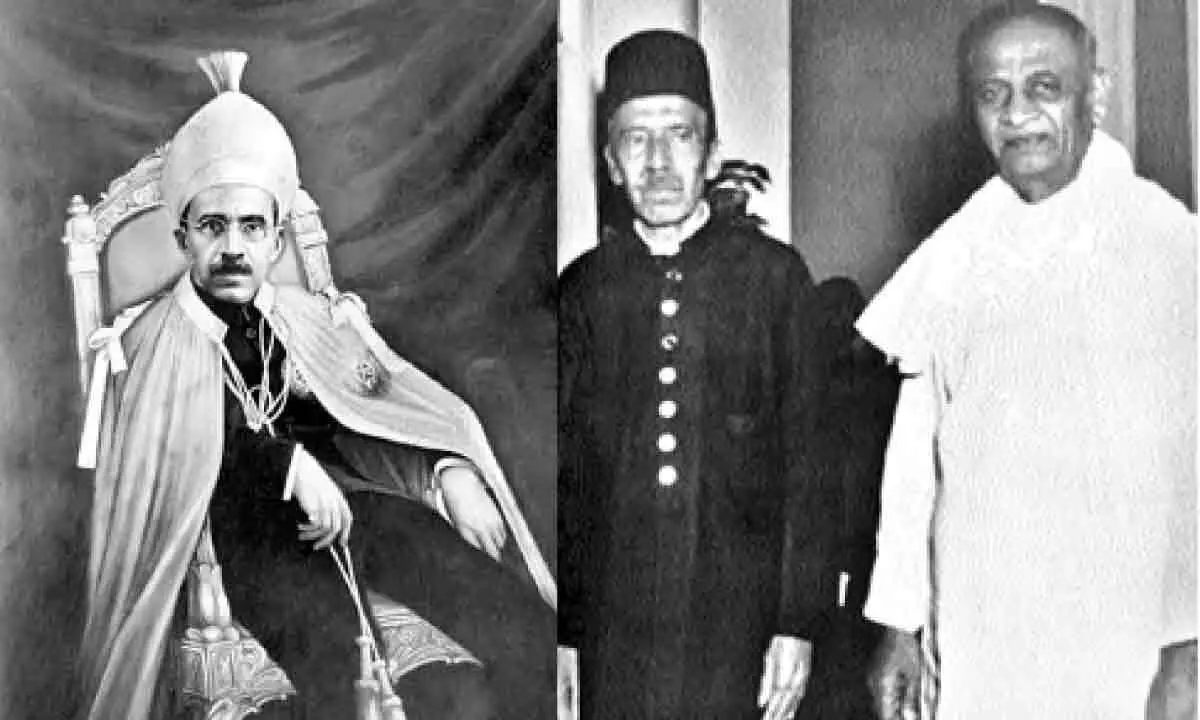Live
- All you need to know about PAN 2.0
- Akasa Air redefines travel experience with industry-first offerings
- MP: Residents stage protests against liquor shop in Indore
- Telugu Actor Shri Tej Booked for Alleged Cheating and False Promise of Marriage in Live-in Relationship
- Toyota Kirloskar Motor Celebrates 1 Lakh Urban Cruiser Hyryder on Indian Road
- MLS: New York City FC part ways with head coach Nick Cushing
- Delhi CM says Centre cutting AAP voters’ names from rolls, BJP hits back
- Hyderabad Metro Rail Phase-II Works to Begin in Old City in January 2025
- Odisha: 668 persons killed in human-elephant conflicts in last three years
- DEFENDER JOURNEYS: TO EMBARK ON ITS THIRD EDITION FROM NOVEMBER 2024
Just In
Hyderabad: It pains to see continuous vilification of Nizam, says great grandson Mir Osman Ali Khan


Each time during electioneering politicians depict him as villain, says Himayat Ali Mirza
Hyderabad : Questioning the ‘vilification’ of Nizam VII the descendants urged the Election Commission of India to issue directives to political parties, preventing the purported exploitation of Mir Osman Ali Khan for ‘political and electoral gains’.
Speaking to The Hans India, Himayat Ali Mirza, the great grandson of Nizam VII but felt that each time during electioneering politicians in Telangana depict him as villain. “Despite contemporary attempts to portray Nizam as a traitor, I would like to question the motives behind such divisive rhetoric. It is essential to remember that Sardar Vallabhbhai Patel Ji, an icon whose ideology aligns closely with the BJP, appointed Nizam as the first Governor of Andhra Pradesh. Why would Sardar Patelji make a traitor or anti-Indian the first governor of Hyderabad,” he asked.
Expressing disappointment over the way things have transformed in the largest democracy, he stressed that despite these pleas to political parties and the Election Commission, no action has been taken to address this issue.
“I will be pursuing a defamation case of 10 crores in the esteemed Supreme Court of India if there is any disrespect shown further towards the name of Nizam, my great grandfather,” he cautioned.
Deccan Heritage Trust’s managing trustee Mohammad Safiullah while referring to the book ‘Operation Polo’, the police action against Hyderabad written by S N Prasad which was published in 1972, said that this clearly indicates that the accession of Hyderabad State took place in January 1950. “It is clearly mentioned that the accession of Hyderabad State took place much later, that is, 26 January, 1950 and not in September, 1948 as being observed” he said. On page No.110 of the book, it says that on September 19, 1948 it was announced that Kasim Razvi had been captured by Hyderabad troops from his hiding place in his brother-in-law’s house and handed over to the Indian military authorities.
“On September 21, 1948, the Military Administration announced a number of measures…The accession of Hyderabad State to the Indian Union took place several months later,” the book says in its first paragraph of subject ‘Accession’.
Meanwhile Amjed Ullah Khan, MBT leader, accused the BJP of attempting to distort the history of Hyderabad by celebrating ‘Liberation Day’ on September 17. He also condemned the ruling BRS and All India Majlis-e-Ittehadul Muslimeen (AIMIM) for endorsing the BJP’s narrative by organising ‘National Integration Day’.
“The move by the BJP, BRS, and AIMIM to mark September 17 as ‘National Integration Day’ is deeply concerning and paints a skewed narrative of Hyderabad’s rich history,” he said. “By promoting this day as a ‘liberation’ or ‘Integration ’ day, these parties are not only distorting historical facts but are also opening old wounds, threatening the harmony that defines our great city”, Amjed Ullah Khan said.
Khan said that the narrative that Hyderabad State was some separate entity before 1948 is a gross misrepresentation. He pointed out that the Deccan region, including present-day Hyderabad, has been interwoven into the Indian subcontinent’s cultural, political, and historical fabric for millennia. He cited the Mauryan Empire, the Satavahanas, the Vakatakas, the Chalukyas, the Rashtrakutas, and the Kakatiyas as examples of dynasties that have contributed to the region’s rich history and culture. He also noted that the Deccan saw the advent of Muslim rule with the establishment of the Delhi Sultanate in the 13th century.

© 2024 Hyderabad Media House Limited/The Hans India. All rights reserved. Powered by hocalwire.com






